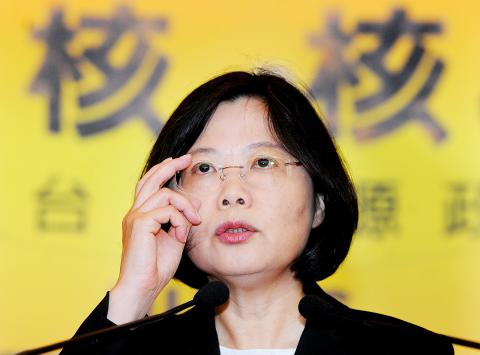|
Tsai asserts her nuclear stance
By Lee I-chia / Staff Reporter

Democratic Progressive Party
Chairperson and presidential candidate Tsai Ing-wen speaks at a forum focused on
nuclear power policies in Taipei yesterday.
Photo: Liao Chen-huei, Taipei Times
Democratic Progressive Party (DPP)
Chairperson and presidential candidate Tsai Ing-wen (蔡英文) yesterday reaffirmed
her commitment to a “nuclear-free homeland” by 2025 at a civic national affairs
forum focused on nuclear power and energy policies in Taipei.
Tsai said her vision for a nuclear-free homeland would not include an extension
of the operational life of the nation’s three operating nuclear power plants,
but at this time she would support the continued construction — but not eventual
operation — of the Fourth Nuclear Power Plant in New Taipei City’s (新北市)
Gongliao District (貢寮).
Other goals of her plan would include increasing the efficiency of power
generation, developing power-saving technology, increasing the amount energy
produced by renewable resources and developing a sustainable future based on
green economy.
Tsai said she chose 2025 because that was the year the Third Nuclear Power Plant
in Hengchun (恆春), Pingtung County, was scheduled to be shut down.
This would give the nation sufficient time to plan and gradually shift its
energy policy away from nuclear power, she added.
When asked why she supported the continued construction of the Fourth Nuclear
Power Plant, but not its eventual operation, Tsai said the compensation cost for
breaching the construction contract still needed to be evaluated before a final
decision could be made.
Tsai said the nation already had spare electricity and that only 18 percent of
the country’s electricity is produced by nuclear power.
Based on estimates by the Ministry of Economic Affairs, the nation would not run
out of electricity even if all the nuclear power plants were shut down
immediately, she said.
Tsai said the president must have the ability to face the toughest decisions and
respond to the public’s will, instead of leaving the problems to the next
generation.
Policies should not be empty slogans, but should have clear timelines and
details of when they would be fulfilled, she said, adding that this nuclear-free
timeline should make it possible to solve both the problems of resources and
energy.
Tsai said a referendum to stop nuclear power in Italy and Germany’s efforts to
increase the proportion of energy generated by renewable energy were examples of
how other countries had decided to adopt a green energy policy — a path that
Taiwan should follow.
|
![]()
![]()
![]()